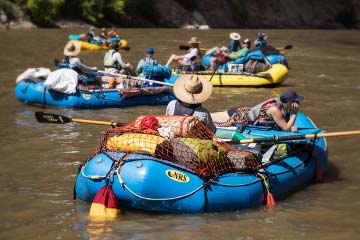Leave No Trace, Please
“A thing is right when it tends to preserve the integrity, stability, and beauty of the biotic community. It is wrong when it tends otherwise.”
—Aldo Leopold, A Sand County Almanac
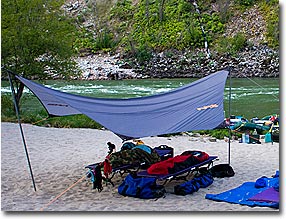 For many of us, one of the most important reasons we boat is to enjoy the beauty and solitude of nature. While we may love going to a local play spot and take turns surfing a great hole, we also crave the serenity of more remote country. And nothing spoils that like a trashed out campsite or rude behavior by another boater. Each of us is obligated to do all we can to keep natural recreation areas pristine and as unaffected as possible by our presence—for others, as well as for ourselves.
For many of us, one of the most important reasons we boat is to enjoy the beauty and solitude of nature. While we may love going to a local play spot and take turns surfing a great hole, we also crave the serenity of more remote country. And nothing spoils that like a trashed out campsite or rude behavior by another boater. Each of us is obligated to do all we can to keep natural recreation areas pristine and as unaffected as possible by our presence—for others, as well as for ourselves.
The Leave No Trace Center for Outdoor Ethics (www.LNT.org), an international non-profit education and advocacy organization, offers seven principles for “Leave No Trace” enjoyment of the outdoors:
- Plan ahead and prepare
- Travel and camp on durable surfaces
- Dispose of waste properly
- Leave what you find
- Minimize campfire impacts
- Respect wildlife
- Be considerate of other visitors.
Plan Ahead
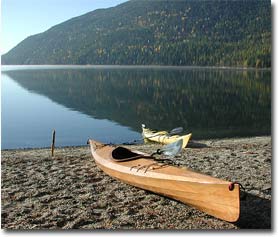 Careful planning is essential for minimizing your impact on the environment when boating. If you’re going into an area where permits are required, study the info supplied by the permitting agency—it will usually highlight important requirements for that area. As a general rule, you’ll need to bring a camp stove, a firepan, equipment for washing dishes and straining dishwater and receptacles for carrying out human waste and trash.
Careful planning is essential for minimizing your impact on the environment when boating. If you’re going into an area where permits are required, study the info supplied by the permitting agency—it will usually highlight important requirements for that area. As a general rule, you’ll need to bring a camp stove, a firepan, equipment for washing dishes and straining dishwater and receptacles for carrying out human waste and trash.
Be a Low-Impact Camper
As boaters, our travel on water leaves no trace—our major impact occurs once we land. Hike only on designated trails. Choose established campsites that are big enough for your group, and avoid moving tent sites into unimpacted areas. Camp on beaches, sandbars or other non-vegetated areas below the high-water line if established campsites aren’t available. Since the kitchen area gets the most use, be sure to locate it in a low-impact (or highly used) area. Consider using a kitchen floor tarp to catch drops and spills. Strain dishwater, put the scraps in your trash and broadcast the dishwater above the high-water mark.
After brushing your teeth, dilute the rinse water to avoid leaving “seagull droppings”. To minimize campfire impacts, use a firepan, and either bring your own wood or use driftwood. Be careful to avoid starting a wildfire, and pack out your ashes. Minimizing food packaging helps simplify trash carryout. Plan to recycle as much trash as possible, especially aluminum and plastic beverage containers.
“Waste Not” in the Wrong Places
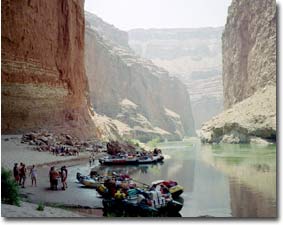 Pack out your human waste using one of the many good systems available. A coffee can, small paper bags and some deodorizer can be used for a daytime toilet; this waste can then be added to that in the regular toilet when you get to camp. And don’t forget to pick up your dog’s solid waste and pack it out too!
Pack out your human waste using one of the many good systems available. A coffee can, small paper bags and some deodorizer can be used for a daytime toilet; this waste can then be added to that in the regular toilet when you get to camp. And don’t forget to pick up your dog’s solid waste and pack it out too!
Regulations for depositing urine vary depending on the area; the usual rule in higher-volume waters and arid areas is to urinate in the water or on wet sand. Be sure to check out local regulations or accepted practices.
Each day before leaving camp, have someone from your party police the entire campsite. Make a special effort to collect and dispose of “micro-trash”, like small bits of plastic and paper, and leave each site cleaner than you found it.
Mind Your Manners
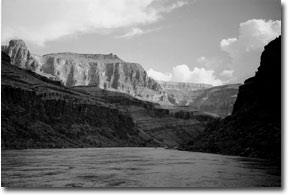 It’s really nice when we’ve got the Great Outdoors to ourselves, but our favorite forms of recreation have now gotten so popular that we’re often sharing the water with others. A Golden Rule of boating etiquette is simply to do unto others as you would want them to do to you. Discuss campsite selection with other parties you encounter. If you stay near another group, be aware of the noise level in your camp. While it may be fun for you to bring your dog along, others in your party may not be so tickled, so be sure to control your pet. On rivers that you share with power boaters, give them room to pass you in the flat stretches, and let them through rapids first if they’re already committed to a line. In many areas, space along a river is considered public domain only up to the high-water mark; remember to respect the private property you’re boating through. Landowners appreciate this, and they’re much more likely to be friendly to the next group of boaters.
It’s really nice when we’ve got the Great Outdoors to ourselves, but our favorite forms of recreation have now gotten so popular that we’re often sharing the water with others. A Golden Rule of boating etiquette is simply to do unto others as you would want them to do to you. Discuss campsite selection with other parties you encounter. If you stay near another group, be aware of the noise level in your camp. While it may be fun for you to bring your dog along, others in your party may not be so tickled, so be sure to control your pet. On rivers that you share with power boaters, give them room to pass you in the flat stretches, and let them through rapids first if they’re already committed to a line. In many areas, space along a river is considered public domain only up to the high-water mark; remember to respect the private property you’re boating through. Landowners appreciate this, and they’re much more likely to be friendly to the next group of boaters.
Don’t Feed the Animals
Show your respect for the wildlife you encounter by observing them from a distance. Don’t feed animals; keep food and garbage in secure containers and stored away from prowling critters, especially at night.
In short: Leave What You Find. Take Nothing but Photographs; Leave Nothing but Footprints. Have a great trip, and we’ll see you on the water!
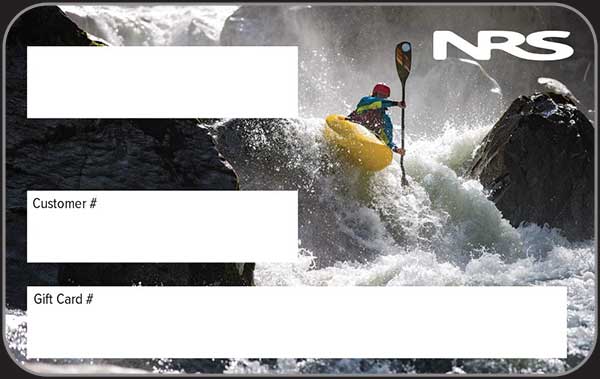 NRS Gift Card: Always Fits, Always Wanted
NRS Gift Card: Always Fits, Always Wanted

